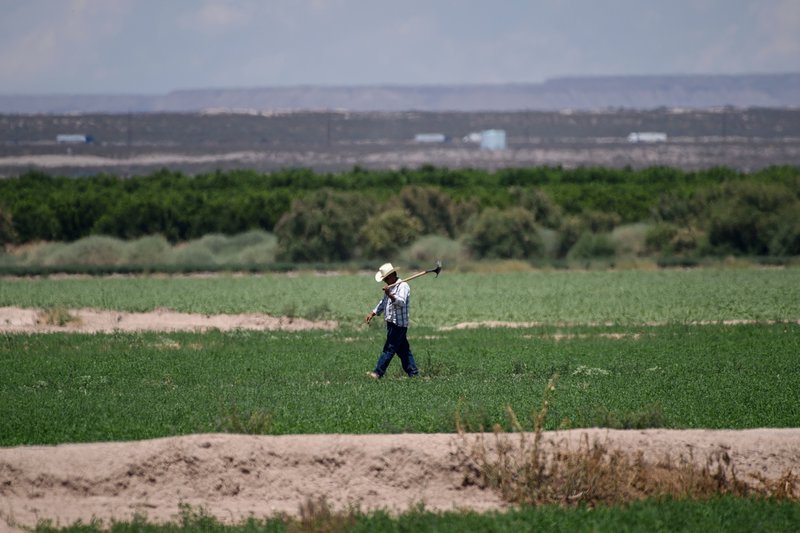特朗普的贸易战让美国农民很受伤

|
战争带来混乱,特朗普总统很快发现这同样适用于贸易战。他发动的这场贸易战争正要把包括美国在内的全球经济都拉到“兔子洞”里。但如果他不能迅速意识到这一点,美国农民将会成为最受伤的人。 农民们早就知道贸易战会有多糟糕。他们的出口规模很大,每年向海外输送约1500亿美元农产品。美国之外的市场消费了他们种植和养殖产品的三分之一还要多。当然,美国也进口很多食品,但农业仍是为数不多的实现高额贸易顺差的行业,具有很强的生产力和竞争力。美国农民的产品地球人都需要。 而对农民来说,没有比贸易战更糟糕的了。对他们而言,其他国家对美国大豆、猪肉或橙汁征收关税就像一把扎在心头的尖刀。而这正是中国和其贸易伙伴国就特朗普的贸易战采取的对策。 我们的总统知道自己的这场农业战争在经济和政治领域的影响,他的应对措施是为农民拨款120亿美元。农民们将从9月开始拿到这笔来自纳税人的紧急救助资金,而且无需获得美国国会批准。部分农民将直接获得现金,但也有一部分拨款将投入现有项目,以采购过剩的农产品,并将其分配给食品救济机构。在海外推广美国农产品的营销活动可能也会获得更多资金。 而要得到此项补偿,农民可能得对特朗普政府毕恭毕敬。制造商现在就在这么做,以便获得特朗普的钢铝关税豁免。他们正在尴尬地想着办法,为的是让特朗普任命的官员相信应该缓征涉及到他们的关税。对于此项补偿,农民们不会喜欢,特别是考虑到他们最终从政府嘴里抠出来的钱实在是太少,来的也实在是太迟了。 这仍是一场低烈度战争,至少目前如此。美国对价值约1000亿美元的进口商品提高了关税,这些商品来自中国这样的竞争对手以及加拿大、欧洲、日本和墨西哥这样的友邦。但我们的总统已经威胁说要显著扩大战争规模,提高所有中国商品的税率,同时对共计三分之一的进口车征收更高的关税。 我们的贸易伙伴并未束手就擒,他们已经开始对美国出口商品征收对等关税。中国方面还让人民币兑美元汇率下跌,从而部分抵消美国关税上升的影响。另外,中国还采取了非关税措施,比如对运抵中国港口的美国农产品进行更严格的检查。 我们的总统曾傲娇地宣称打赢贸易战很容易,而以上就是到目前为止的情况。 对受了伤的美国贸易伙伴来说,美国农民是很便捷的政治目标,这让问题变得更为复杂。美国乡村一般都是特朗普的基地,在大选中投票支持他的比例很高。其他国家发现,跟特朗普讨价还价的最有效办法就是让那些投票支持他的人过得艰难起来,这么想一点儿也没错。 这种策略已经开始奏效。农民权益团体对关税的抱怨之声越来越高。他们在政治上或许同情总统先生,但他们需要贸易战停下来。 让他们更焦虑的是,美国农业带的资金状况已经捉襟见肘。甚至是在贸易战开打前,大多数农产品的价格已经比几年前的高点低了几乎两成。四年来,农业用地的价值一直原地踏步,就足以体现这种压力。如果关税让农民出口的产品少于其产量,他们的资金问题就会迅速恶化。 我们的总统想把贸易战作为谈判手段,以迫使其他国家让步。他让大家耐心一点儿。但如果这是一种尽人皆知的谈判手段,那它还会有什么用呢?会有人认为中国或者美国的其他任何贸易伙伴还不知道我们的总统想干什么吗? 特朗普确实刚刚和欧洲达成停战协议,但这又有什么用?除了继续进行磋商的承诺,他在欧洲兄弟那里一无所获。就算美国和欧洲像我们的总统规划的那样互相取消所有关税,这对我们的经济也没什么实质性影响。美国和欧洲的全部贸易关税都发生变化也不足以产生重大影响。 或许,中国有问题。但威胁让贸易战升级只会让两个国家的大好经济形势都面临风险。 希望这120亿美元拨款不会让我们的农民陷入沉默,希望他们能继续给特朗普施加压力,让他结束自己的贸易战。他们的呼声也许是总统唯一会聆听的理性声音。(财富中文网) 本文作者马克·赞迪是穆迪分析(Moody’s Analytics)的首席经济学家。 译者:Charlie 审校:夏林 |
War is messy, and President Trump is quickly figuring out that this also applies to trade wars. The president has incited a trade war that is taking the entire global economy, including ours, down the rabbit hole. Our farmers will be the most serious casualty if he doesn’t figure this out, and soon. Farmers already know how messy the trade war can be. They are big exporters, shipping some $150 billion in agricultural products overseas each year. Well over one-third of everything they grow or raise is consumed by foreigners. The U.S. also imports a lot of food, but agriculture is one of the few industries that runs a sizable trade surplus. The industry is uber-productive and competitive. American farmers produce something everyone on the planet wants. Nothing could be worse for farmers than a trade war. If other countries impose tariffs on U.S. soybeans, pork, or orange juice, it is a dagger in the heart of the business of being a farmer. This is exactly what China and our other trading partners are doing in retaliation to Trump’s trade war. The president understands the economic and political fallout of his war on agriculture, and his response is to cut a $12 billion check to farmers. The emergency bailout from taxpayers will become available in September, and does not need approval from Congress. Some farmers will get direct payments, but the money will also go to fund a program already in place to purchase surplus farm products and distribute them to food banks. Marketing efforts to promote U.S. agricultural products overseas may also get more funding. To get a check, farmers will likely have to go hat-in-hand to Washington. This is what manufacturers are doing now to get relief from Trump’s steel and aluminum tariffs. They are in the awkward position of trying to convince Trump-appointed bureaucrats that they deserve a reprieve from the tariffs. Farmers will love that (not), particularly since the money they ultimately pry from Washington will be way too little, too late. It’s still a low-intensity war, at least so far, with tariff hikes on about $100 billion worth of imported goods into the U.S. from foes like China, as well as friends, including Canada, Europe, Japan, and Mexico. But the president has threatened to significantly escalate the war, imposing higher tariffs on all imports from China and on auto imports—in all, about one-third of all that we import. Our trading partners aren’t taking this lying down, and have matched Trump’s tariffs one-for-one on U.S. exports to their countries. The Chinese have also allowed their currency to fall in value against the dollar, offsetting some of the bite of higher U.S. tariffs. And they’ve imposed non-tariff measures such as stiffer inspections on U.S. agricultural products arriving at Chinese ports. So much for the president’s haughty pronouncement that a trade war would be easy to win. Complicating things for U.S. farmers is that they are convenient political targets for our aggrieved trading partners. Rural America tends to be Trump country, voting in high percentages for the president in the election. Other countries rightly figure there is no better way to gain leverage with Trump than to make life difficult for those who vote for him. The strategy is working. Trade groups looking out for the farmers’ interests are complaining increasingly loudly about the tariffs. They may be politically sympathetic to the president, but they need the trade war to end. Adding to their angst, the nation’s farm belt is already struggling financially. Even before the trade war broke out, prices for most agricultural products were down almost 20% from the peaks of a few years ago. Farmland values reflect the stress; they have gone nowhere over the last four years. If farmers export less of what they produce because of the tariffs, their financial problems will quickly mount. The president holds out hope that the trade war is a negotiating ploy to pry concessions from the rest of the world. Be patient, he says. But if it is a negotiating ploy, and everyone knows it, how good a ploy could it be? Does anyone think that the Chinese or any other trading partners fail to understand what the president is up to? Trump did just negotiate a truce with the Europeans, but to what end? He got nothing for all the bother except a promise from the Europeans to keep talking. Even if the U.S. and Europe dropped all of their tariffs on each other—the president’s stated objective—it will have no meaningful impact on our economy. The differences in tariffs across all trade between the U.S. and Europe are not large enough to matter. Maybe China is a problem. But threatening an escalating trade war only threatens the economic success of both countries. Hopefully our farmers won’t be silenced by $12 billion and keep the pressure on Trump to end his trade war. They may be the only reasoned voice he will listen to. Mark Zandi is chief economist at Moody’s Analytics. |













